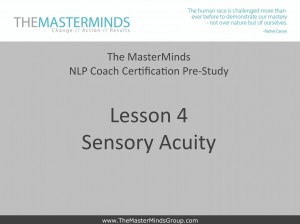Sensory Acuity is one of the MOST important technique used in NLP. Sometimes, we just do it naturally, without knowing that we are in fact using our sensory acuity.
However, knowledge is power! The most successful people are MASTERS at sensory acuity.
Click below to know what to look for and how to do it.

Hi Helene, I am a bit thrown by the skin color (light-dark) part of this lesson. I accept that it may be my blockage based on cultural norms where ‘light skin’ is more preferable and acceptable than ‘dark’ skin. Sometimes, it is even linked to a class or socio-economic status, quite the opposite of the European concept of being ‘tanned’. Or it may be my diversity training that is blocking my understanding of this concept. Please expand. Thanks.
Hi Gulnar,
Very good question! One that also comes back regularly.
Sensory acuity is the ability to detect changes from minute to minute.
We use a process called CALIBRATION to detect those changes. Calibration is a process of comparison 1. with self and 2. in time.
When we speak about skin colour, skin tone, or any of the other criteria we look at for sensory acuity, what we mean is: has this person’s skin tone or colour changed compared to him or herself a few minutes ago?
We are not comparing 2 different persons but the change within one person. Sensory acuity does not involve any judgment as to whether dark or light is better, what we are looking at is whether there is a change or not, because based on this information, we can determine what is going on inside the person.
So obviously, people do not change colour but you will be able to distinguish a difference in shade, as if a light has gone down or been turned up from below the skin.
Skin ‘colour’ as we understand it in NLP (as well as lip size for example) is affected by the flow of blood to the face. The blood flow in the body is determined by how fast the heart beats, faster when under stress and slower when relaxed. Milton Erickson used those criteria to determine whether a client had gone into a trance or not.
Does that answer your question?
Interesting. Similar to some of the traditional chinese medicine patient diagnosis ‘markers’.
Fascinating Roy. Tell us more during the course when we go through sensory acuity.
Hi Sil,
Yes there are many opportunities to train sensory acuity and TV is definitely a great source. TV quiz and talk shows as you say, and any interview, especially on difficult topics, of politicians, celebrities etc…